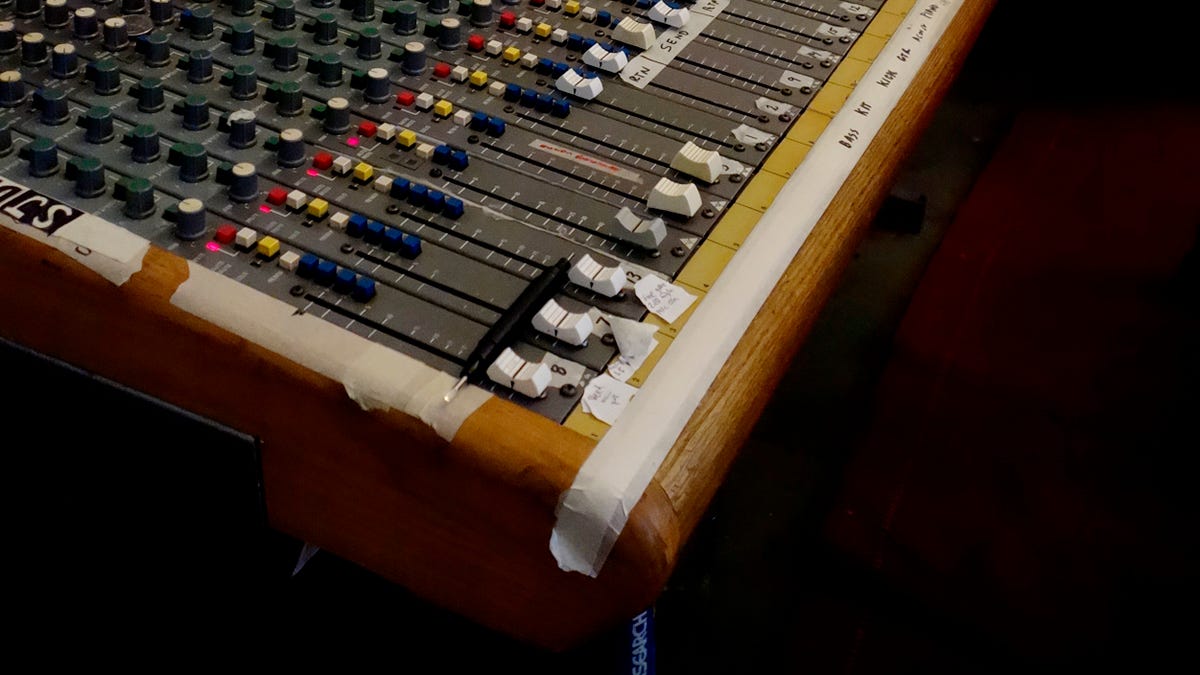Welcome to Brooklyn's Daptone Records, a recording studio that never went digital
The Audiophiliac drops by Daptone Studios and gets an earful.

I've always had a soft spot in my heart for Daptone, Brooklyn's legendary soul, funk, and rhythm & blues record label. Their very first release in 2001, Sharon Jones and the Dap-Kings "Dap Dippin'," hit it big with a raw, stompin' power that stands up to the best of Stax and Chess records of the 1960s. Amy Winehouse was a Daptone fan, and recorded a few tunes for her "Back to Black" album in the Brooklyn studio.
I recently contacted Daptone producer/engineer Wayne Gordon to see how the magic happens, and when I arrived my first order of business was checking out Daptone's 8 track Ampex reel-to-reel analog recorder. The machine stands five feet tall, and the entire recording chain, including the Trident mixing desk is vintage.
Steve Guttenberg and Wayne Gordon at Daptone Studios
Every note you hear on a Daptone album was played by Daptone artists at their sessions, and never fabricated, Auto-Tuned, or subjected to any other form of processing in post session mixing or digital editing. That dedication to musical authenticity is exceedingly rare in most of today's music. The sessions' analog tapes are edited by cutting them with a razor blade and spliced, just like all music was in the pre-digital days (mid 1980s). Visiting Daptone was like a trip in the way back machine, and I enjoyed every minute of it!
When Daptone records a Sharon Jones tune with her vocals, plus keyboards, guitars, piano, bass, drums, percussion, saxophones, trumpets, backup singers, and a string section, everything fits on 8 tracks. If there are 20 musicians, three or four players might wind up on a single track! The Daptone approach is "organic" in that it doesn't use tech to fix or change the sound, so if the drums are too loud, Gordon would just ask the drummer to play a little more quietly. Eight tracks should be a piece of cake, in the first half of the 1960s most of the greatest music of that era was recorded on four or fewer tracks!
Daptone captures the sound of the band in the studio and puts that on the record, as Gordon put it, "We spend a lot of time on the arrangements, and getting the sound we want, before we record. Then we do a couple of takes, more than anything it's just a matter of what feels right."
Daptone's core music is still very much unadulterated soul/rhythm & blues, so when I heard the new Mystery Lights psychedelic rock album was on Daptone I immediately bought it. Gordon produced and engineered the album, and made the record sound like the Mystery Lights live shows. Mike Brandon, the lead singer/guitarist jumps around a lot when he performs, so there was no way he was going to stay on the mike, so Gordon had him use a hand-held mike, singing "live" with the band for the sessions. I was amazed that a young rock band wanted to record at Daptone, where they can't fix their mistakes in the mix, but Gordon assured me they were totally into it.
Daptone's Ampex 8 track analog recorder
Recording to analog with just 8 tracks means that when the guitarist wants to do another take of his solo, Gordon can't "save" the original, the new solo is going to be recorded over the original. Some musicians rise to the challenge of recording this way, and play better. If they can't, they don't record for Daptone.
The label recently dipped into Reggae with The Frightnrs release, "Nothing More To Say." The guys are from Queens, and Gordon bonded with them, and they all became friends. It's Reggae, but it's Daptone Reggae, so it has that old school feel and soul.
Gordon positively lit up when we talked about psychedelic rockers King Gizzard and the Lizard Wizard, and he said, "Those are my boys!" The band isn't on Daptone, but Gordon recorded parts of their "Quarters!," "I'm in Your Mind Fuzz," and "Nonagon Infinity" albums at the Daptone Studio. The band hails from Melbourne, Australia, but when they pass through on tour in the US they try to lay down tracks at Daptone, they love the sound there.
Daptone has always been a musical cooperative, from the earliest days when the musicians literally rolled up their sleeves and built the studio. Sharon Jones helped with the electrical wiring, and Charles Bradley showed them how to install radiators. Another guy's father helped them float the isolation booth's floor on old tires.
Gordon is currently recording the next Jones album, and Gordon describes her as "family," and Gabriel Roth and Neal Sugarman, the owners of Daptone as his "brothers," they're all in it together.

